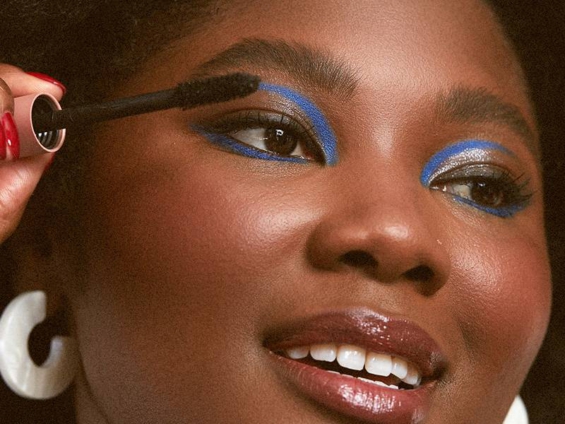TikTok fan? Chances are you've seen a lot of people talking about mascara recently - but it isn't about make-up.
People have been using the word to talk about relationships in a way that avoids TikTok's censorship filters.
Since the #mascara trend originated less than two weeks ago, it's racked up more than 100 million views.
The secret code started off confusing, then took a darker turn that got actress Julia Fox into a bit of trouble. But what is it all about?
How it started
In the beginning, the mascara trend was fairly wholesome.
Users would post videos - usually with the song Constellations, by Duster - and talk about their experiences, good and bad, with partners.
One said they have had their mascara since they were 14, and "there's nothing like this one anywhere else".
Some weren't so lucky in love.
Another said they didn't know if they would "ever trust any other mascara" after theirs "made my lashes completely fall apart".
How it's going
Like so many trends, it soon grew more sexual.
Mascara, and the mascara wand, soon became code words for a certain body part. Some people even discussed their wand sizes, or how long their mascara lasted.
Then along came discussions of sexual assault and trauma, framed in a way that only those "in the know" would understand.
More than a few people complained it was more than a little confusing.
This confusion landed actress and model Julia Fox in hot water last week when she replied to a video that used this alternative meaning.
The user posted that his mascara was tried "without my consent".
Julia responded: "Idk why but I don't feel bad for u lol".
People were quick to call her out on the comment.
She apologised once she realised her mistake, saying she genuinely thought they were talking about make-up.
Do you speak Algo?
Code words are common on TikTok, and words like grape - rape - and unalive - suicide - are used constantly.
They're all a response to the app's ban on sexually explicit language and content, which can make it hard to talk about sensitive topics.
This language that develops out of tight regulations was given the name "Algospeak" - algorithm speak - by Taylor Lorenz, a Washington Post reporter.
Code words aren't a new thing online. There was a time when most people didn't know what OMG, LOL or IKR meant.
And if you're "in the know", there's not much room for confusion.
As one user wrote: "As much as I hate terms like 'unalive' there is no mistaking what that term means. If you say SA, I either know it means sexual assault or I can Google it and find it."
But they pointed out a specific problem with the #mascaratrend.
"If I Google mascara, all I'll get is actual mascara because make-up companies pay big money for first-page ad space."
What do experts say?
Trauma expert Danny Greeves thinks that TikTok is a poor medium to share traumatic experiences appropriately.
Danny says code words present a "challenge" because they reference a topic indirectly and take away its "emotional significance".
"Topics that would usually command empathy, understanding and sensitivity become trivialised.
"When that occurs - such as with the mascara trend - deeply painful and traumatic events such as sexual assault are minimised."
Educational and child psychologist Dr Amanda Furness isn't quite as convinced and says the developing language might allow young people to discuss experiences more openly.
"But it does give a confusing message and is open to misinterpretation," she says.
In her view, "the most helpful place to start is ensuring that young people feel comfortable and safe talking about their experiences and bodies in a universally understood way".
And she reminds everyone to remember that when you share on social media, you can't control where the information ends up.
Latest Stories
-
We’ll establish fiscal council to rein in excessive borrowing – Finance Minister
5 mins -
Mortuary workers issue fresh strike threat
9 mins -
‘Lapses in banking system are not unique’ – John Awuah on managing fraud in Ghana’s Banks
17 mins -
Bawumia confident of victory in 2024 election
51 mins -
Strengthening audit institutions essential for tackling fiscal mismanagement – Domelevo
1 hour -
Healthy Aging: The Role of the Gut Microbiome and How Diet Can Help
1 hour -
Seek medical care, diagnosis for breast cancer – Dr Abiti to women
1 hour -
Hardship: Men now collect marriage list from different families to get cheapest – Report
1 hour -
‘If you’re looking for trouble, you’ll get it,’ Falz tells VeryDarkMan
1 hour -
Paramount Chief of Avenor grateful to NPP, calls for completion of Agenda 111 project
2 hours -
Bawumia commissions ultramodern office complex for Ho Municipal Assembly
2 hours -
Bawumia declares NPP’s infrastructure record unmatched
2 hours -
Importers face duty on Electric Vehicles despite gov’t’s exemption promises
2 hours -
4 additional Democracy Hub protesters discharged
2 hours -
Election 2024: Alan Kyerematen lacks a message – Hassan Ayariga
2 hours

